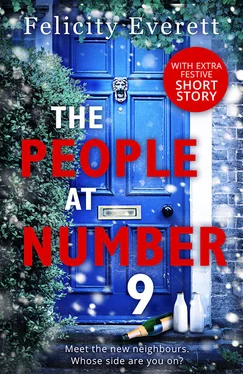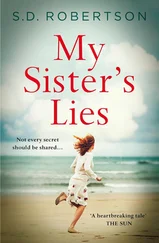“Well,” Sara said, “what can I get you?”
She had been about to list a variety of herbal teas, when Lou shrugged and declared herself equally happy with red or white. They were soon installed at the kitchen table, a bottle of Shiraz nestling among the empty pasta bowls. While Lou knocked back wine like Ribena and enthused about the vibrancy of the neighbourhood, Sara studied her guest’s appearance. She was not quite beautiful. Everything was just a fraction off; the eyes too wide-set, the nose a tad flared. Yet she had managed to make a virtue of these defects – a flick of eyeliner, a discreet silver hoop through one nostril – so that mere beauty no longer seemed the point. Her hair, now almost dry, had resolved itself into a short mop of corkscrew curls, which she thrust around her head as she talked, as if the weight of it irked her.
When their kids hadn’t turned up at Cranmer Road, Sara had assumed they must have sent them to a private school, but Lou told her this wasn’t the case.
“We thought we’d wait for the new school year, rather than pick up the fag end,” she explained. “Where they were before was so tiny, and the curriculum was so different. I say curriculum…” She laughed and shook her head.
“Where was that?” Sara asked.
“Oh, didn’t you know? We were living in Spain. A little village in the mountains, not far from Loja.”
“Sounds idyllic,” said Sara.
“It was,” agreed Lou, with a wistful sigh. “I pine for it, but Dash is starting Year Six in September, so we had a decision to make.”
Sara wondered if they had made the right one. She knew plenty of local parents who, faced with the scramble for places at the mediocre state secondaries in their borough, would have considered a mountain shack staffed by a goat-herd to be a better bet.
“I’d love to live abroad,” she said, “but Neil’s job isn’t very portable…”
“Oh there’s always a reason not to do things.” Lou tugged a tendril of hair in front of her eyes and examined it, before letting it spring back into place. “What you have to do is look for the reasons to do it.”
“That is so true. I’m just a bit of a ditherer, I suppose. It’s such a big leap, isn’t it? And I’d be worried about not fitting in.”
“Mmmm…” said Lou ominously.
“Was that hard, then?”
“Yes and no. They’re very straightforward, the Spanish. If they don’t like you, they tell you to your face and their kids throw stones at your kids.”
Sara clutched her cheeks in mute dismay.
“It’s harsh, I know,” Lou went on, “but it’s kind of preferable to that awful thing the English do of keeping a poker face and making you guess what you’ve done wrong. Anyway, the flipside is, if you can turn it around, you’ve got friends for life.”
“And how do you turn it around?”
“Oh you work hard and you make yourself useful… and you tell your kids to throw stones back.”
“Seriously?”
“Seriously. Stopped overnight,” Lou replied, straight-faced. “And, thank God, because that first winter was hard . You can’t be self-sufficient in a community like that. It’s all tit for tat. You harvest my olives, I’ll fix your generator, sort of thing.”
“How fantastic,” said Sara.
“It is. There really is no better system when it’s working well. Everyone rallies round; there’s a sense of community. You share your surplus produce so there’s no waste.”
“Like a commune.” Sara stared wistfully out of the window at the serried garden fences of their own little enclave, dividing neighbour from neighbour as far as the eye could see. When she looked back, she was astonished to see Lou pressing her middle finger to the bridge of her nose, apparently holding back tears.
“Lou?” she said.
“Sorry.” Lou took a deep, shuddery breath. “I don’t know where that came from.”
Sara maintained a tactful silence, embarrassed, yet also thrilled that Lou seemed about to confide in her.
“We had four-and-a-half blissful years in Riofrio. We made some very, very good friends. People I’d trust with my life.”
“I’m sensing a but…?”
Lou took a gulp of wine and composed herself.
“It was a misunderstanding really. There isn’t a court in Spain that would have ruled in their favour…”
“A court ?”
“Oh, it’s nothing terrible, honestly. As I say, a misunderstanding. If we’d had any money, we could have proved it…”
Sara frowned and sat forward in her seat, warming to her role as confidante.
Their neighbours, Dolores and Miguel Fernandez, had a smallholding further down the hill, Lou told her, a few sheep and an orchard. Miguel helped Gavin do the wiring for his studio and she and Gav pitched in at harvest time. So far, so neighbourly, but then the Fernandez decided to farm trout. A bit greedy really, according to Lou, because they were doing just fine as they were. But there were grants available and it looked good on paper.
“Typical Spain – to hell with the integrity of the landscape, bugger the ecosystem – if it ekes out a few more euros, go for it. The irony was,” she hugged herself and looked at the ceiling, blinking back tears, “Gavin helped them build the tanks. Worked flat out, even though he was meant to be getting his exhibition together for the Venice Biennale.”
It had only been up and running a week when they realised it was a disaster, she recalled. The constant whirring of the pumps gave Lou migraines, they didn’t know what to do with all the free trout (God knows they weren’t going to eat it, not the way those pellets smelled). The tanks were an eyesore. But they kept quiet because the Fernandez were their friends and they could see the bigger picture.
“And then one weekend,” she spread her hands wide, like a child, “all the fish died and they said it was Gavin’s fault.”
Sara shook her head.
“I know. Crazy,” said Lou, “but they claimed it was the residue from his studio.”
“Residue?”
“Gypsum, from the plaster of Paris. Of course you don’t know his work, do you?”
Sara shrugged apologetically.
“Well he’s been using it for years. Anyway, he’d hosed down his studio floor, and they claimed it ran down the mountain and contaminated their tanks.”
“Oh dear.”
“Never mind that the farm next door’s using God knows what on their rape. Never mind that Miguel’s an alcoholic and he could have just put the wrong chemicals in. We’re the newcomers, so it’s our fault, right?”
Her hand flexed convulsively on the oilcloth and a single tear brimmed over and tumbled down her cheek. Sara’s throat tightened in sympathy. She reached out to cover Lou’s hand with her own, but somehow suffered a failure of nerve and went instead for the tissue box.
“Thanks,” said Lou, honking noisily into the paper handkerchief. She met Sara’s eye with a brave smile.
“Well,” said Sara briskly, after a brief silence, “I for one am grateful to them.”
Lou looked puzzled.
“To the Fernandezes, or whatever they’re called. If it wasn’t for them and their stupid trout, you wouldn’t be here now, would you? We wouldn’t have you as neighbours.”
“ Oh! ” Lou gave her a tremulous smile.
The doorbell rang and Sara glanced at the clock.
“Shit!” she said. “Guitar.”
And with that, the spell was broken. Lou was a neighbour she hardly knew, the kitchen looked like a bomb had hit it and Caleb hadn’t practised Cavatina all week. She flew down the hall and let the guitar teacher in, noticing, even as she burbled apologetically to him about the chaos, the flicker of interest he betrayed as he passed Lou in the hall. It was the kind of glance Sara herself never elicited – not sexual exactly, though there was that in it – more a look of recognition. You are of my kind, the look said, or of the kind to which I aspire. And whilst appearing oblivious, Lou nevertheless managed both to acknowledge his need and to remain aloof from it. Sara felt a pang of envy.
Читать дальше












